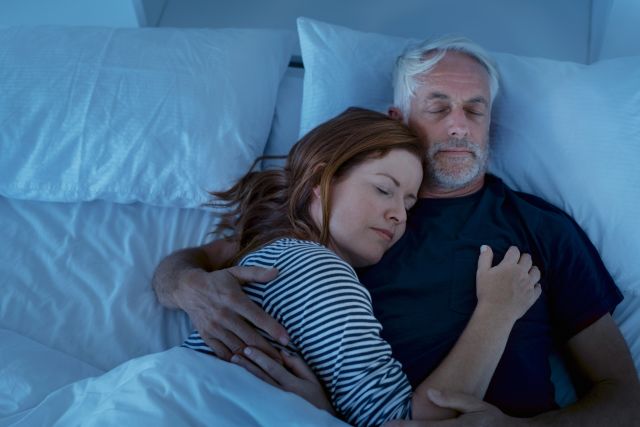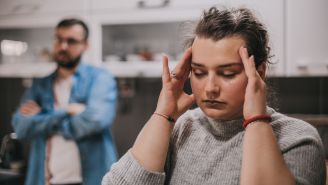Updated on July 25, 2023.
You may know that menopause is linked to sleep issues, and that lack of sleep is associated with health conditions like heart disease, weight gain, hypertension, and depression. But an increasing body of evidence suggests that inadequate sleep during menopause and perimenopause may be connected to lower satisfaction with sex, as well.
For example, a 2017 study published in the journal Menopause found that women ages 50 to 79 who slept fewer than seven to eight hours a night were less satisfied with their sex lives than women who slept longer. What’s more, women over 70 who slept fewer than five hours a night were 30 percent less likely to be sexually active than those women who were sleeping seven to eight hours.
While the study didn't prove that lack of sleep caused a decline in sexual activity, it may have played a role. Here’s how sleep could affect sex, as well as tips for getting a good night’s rest.
Why the connection?
There are multiple potential connections between inadequate sleep and issues with sex. For one thing, as you age, the risk of sleep disorders increases, which can influence your sex life. Colorado-based sleep specialist Dawn Stanley, MD, says she sees a spike in insomnia and sleep apnea in patients in their 50s and 60s, and in those going through perimenopause and menopause. During this time, many people have a hard time sleeping due to symptoms like hot flashes. Drops in estrogen can also lead to loss of muscle integrity and an increased risk of sleep apnea.
Mental health can play a role. “Sleep deprivation, regardless of the cause, can contribute to mood disorders like depression and anxiety,” says Dr. Stanley. It works the other way, too—just as poor sleep can exacerbate depression and anxiety, depression and anxiety can exacerbate poor sleep. As a result, it may be difficult to have a sexually satisfying encounter, says Stanley, “if you're overly tired and you're not able to concentrate on things.”
How to improve sleep
"Obviously, getting more sleep isn’t the cure for all sexual problems," says Stanley—but it may help. Try these strategies for improving your ability to fall and stay asleep at night.
Keep a log. If you don’t know how much sleep you get nightly, try using a sleep tracker, like Sharecare, available for iOS and Android. Or, you can take notes in a journal about when you go to bed and wake up, how long it takes you to fall asleep, and whether you awaken at night. Once you can pinpoint your problem areas, you can work on fine-tuning your habits to address them.
Try to maintain a schedule. It may be harder on the weekends, but sticking to a sleep routine can regulate your body’s internal clock, helping you to fall asleep faster and avoid sleep disruption. Try setting your alarm for the same time every morning and going to sleep at the same time each night.
Watch what you eat. Try eating a balanced diet rich in fruits and vegetables, and steer clear of spicy or fatty foods in the hours before bedtime, which can keep you awake. Large meals later in the day can also prevent you from nodding off.
Take some time to relax. Winding down at night can help you mentally prepare for sleep. For example, a soothing bath, a date with your favorite book, or meditation can calm your mind in the evening hours.
Lose the light. Electronic devices like smartphones, tablets, and TVs emit a bright light that may keep you awake and alert. Try ditching technology before bed—especially social media—and turn alarm clocks, phones, and other light-emitting devices so they face away from you. It’s wise to keep computers and tablets out of your bedroom completely, as it removes the temptation to use them.
Work on building a sleep sanctuary. One of the best ways to improve sleep is making sure your bedroom is comfortable and relaxing. The temperature should be on the cooler side, ideally between 60 and 67 degrees. Darken the room by closing shades and blinds and try to minimize noise. Earplugs and sleeping masks can help if you have a partner who snores or needs a light on to sleep. “White noise” machines can also help drown out in-room disruptions and sounds from outside.
Don’t forget to assess your mattress. Many manufacturers claim mattresses last about six to eight years, so consider replacing them after that timeframe.
Consider hormone replacement therapy (HRT). One wise move is asking your healthcare provider (HCP) about hormonal replacement therapy (HRT). HRT can effectively treat common menopausal troubles like hot flashes and night sweats, which may make it easier to get through the night. It can also relieve symptoms of vaginal dryness, a common sexual issue among people in perimenopause and menopause.







